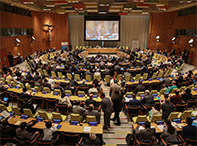Everyone is responsible for implementing the 2030 Agenda on Sustainable Development, participants stressed throughout the first week of discussions of the High-level Political Forum on Sustainable Development (HLPF).
Key messages emerging from these discussions highlighted social inclusion as critical for sustainable development, and the importance of addressing inclusion in education, labor and political institutions and policies.
 15 July 2016: Everyone is responsible for implementing the 2030 Agenda on Sustainable Development, participants stressed throughout the first week of discussions of the High-level Political Forum on Sustainable Development (HLPF). Key messages emerging from these discussions highlighted social inclusion as critical for sustainable development, and the importance of addressing inclusion in education, labor and political institutions and policies.
15 July 2016: Everyone is responsible for implementing the 2030 Agenda on Sustainable Development, participants stressed throughout the first week of discussions of the High-level Political Forum on Sustainable Development (HLPF). Key messages emerging from these discussions highlighted social inclusion as critical for sustainable development, and the importance of addressing inclusion in education, labor and political institutions and policies.
The HLPF is convening from 11-20 July 2016, at UN Headquarters in New York, US. On 14 July, participants discussed national mechanisms for monitoring and implementing the Sustainable Development Goals (SDGs), countries in special situations and small island developing States (SIDS). On 15 July, discussions addressed the topic, ‘From inspiration to action: Multi-stakeholder engagement for implementation,’ with discussion on implementation by Major Groups and other stakeholders, multi-stakeholder approaches at the national level, and regional experiences.
On ‘National mechanisms for monitoring progress and reporting on implementation for the achievement of SDGs,’ participants underscored the need to contextualize and localize SDG indicators. Participants recommended: early involvement of national statistical offices (NSOs); capacity building in data collection and analysis; statistical partnerships; and use of qualitative and quantitative data. Many shared their country’s national efforts on monitoring and reporting. The Philippines said it will use data from innovative sources, including data generated by the private sector, civil society and citizens, to ensure data disaggregation that leaves no one behind. Montenegro described his country’s monitoring and reporting efforts, including through: a new national strategy on sustainable development, with guiding principles and goals; the “nationalization” of targets and indicators for the SDGs; and adjustments to the existing institutional structure. South Africa said it will host the first World Forum on Sustainable Development Data in January 2017.
Participants highlighted SDGs of particular relevance to SIDS, including SDG 13 (climate change), 14 (life below water), 15 (life on land) and 16 (peace, justice and strong institutions) during the panel, ‘Making the 2030 Agenda deliver for SIDS, building on the SAMOA Pathway.’ Anote Tong, former President of the Republic of Kiribati, underlined climate resilience as a primary goal for SIDS. Participants proposed strategies for overcoming sustainable development challenges faced by SIDS, such as: the importance of data in tracking improvements; the green economy approach; sustainable energy; and public-private partnerships at the local level for SDG implementation.
On countries in special situations, participants highlighted the special needs and circumstances of least developed countries (LDCs), landlocked developing countries (LLDCs), middle-income countries (MICs) and SIDS, with some calling for harmonization of the 2030 Agenda with other global agreements, such as the SAMOA Pathway and the Vienna Programme of Action for LLDCs. Some participants cautioned against waiting to address environmental challenges until peace agreements are reached. One recommended an annual progress report on SDG implementation in countries in special situations. On MICs, participants suggested sustainable development as a means to growth, rather than growth as a means to sustainable development.
On implementation by Major Groups and other stakeholders, participants recognized the role of local and regional authorities in driving implementation of the SDGs, and proposed a list of actions to ensure the inclusion of indigenous peoples, including on data collection. Peter Thomson, Permanent Representative of Fiji and incoming UN General Assembly (UNGA) President, announced that he will hold himself accountable to demonstrate significant progress in each SDG by the end of his term as UNGA President.
On regional experiences, participants presented the outcomes of regional forums, including the Asia Pacific Regional Forum on Sustainable Development, the Africa Regional Forum on Sustainable Development and the Arab Forum for Sustainable Development. The UN Economic Commission for Europe (UNECE) said it is updating and adopting its policy frameworks and targets to implement the 2030 Agenda. The Economic Commission for Latin America and the Caribbean (ECLAC) plans to provide a political and technical forum for countries in the region to exchange experiences and cooperate in the process of developing indicators and baselines.
The HLPF will reconvene for its ministerial segment, from 18-20 July, which will include the presentation of 22 voluntary national reviews. [UN Press Release, HLPF 14 July] [UN Press Release, HLPF 15 July] [IISD RS Coverage of HLPF] [IISD RS Story on HLPF 11 July] [IISD RS Story on HLPF 12 July] [IISD RS Story on HLPF 13 July]